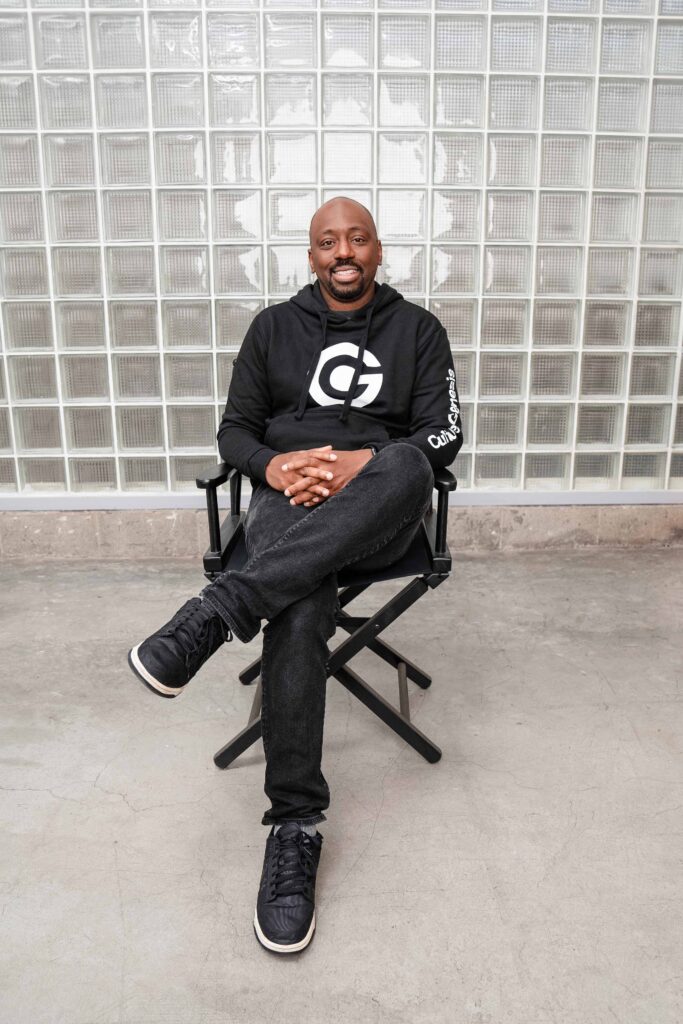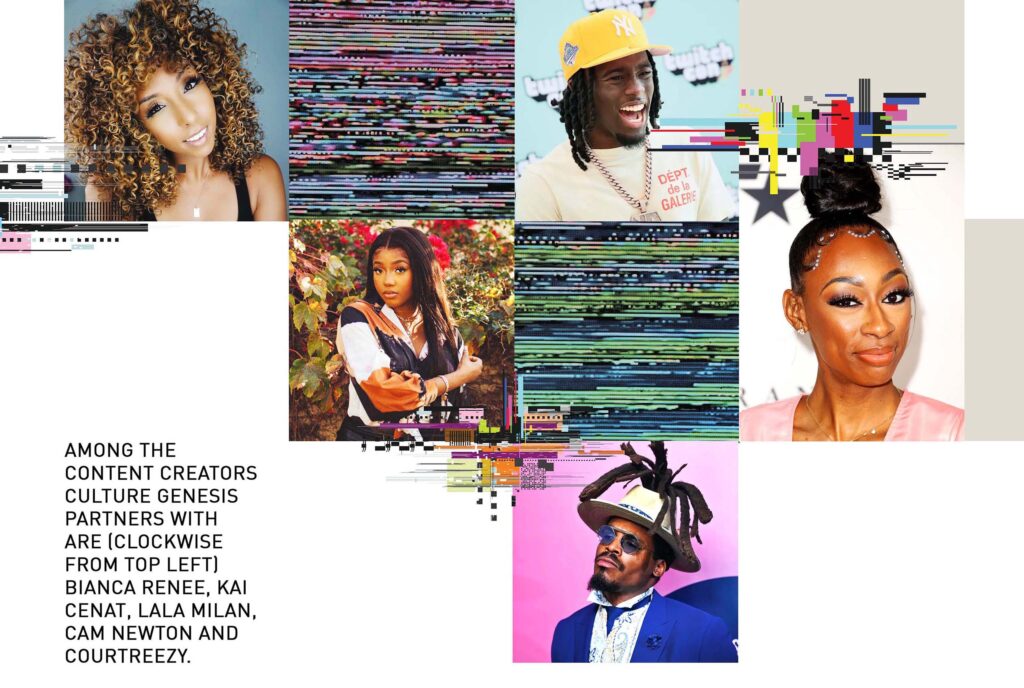The creator economy has opened new doors of financial opportunity for young talent, but they are not cracked as wide for everyone. According to one industry study, Black content creators outperform others by as much as ten times when it comes to impact in some categories, but overall, they make a third less than their white counterparts.
Culture Genesis is helping to correct that imbalance. As the largest YouTube company promoting Black culture—with an audience of 100 million-plus—the business is home to more than 100 creators, including household names such as Kai Cenat, Cam Newton, LaLa Milan and Steve Harvey.
The company’s results over the past few years speak for themselves. Culture Genesis’ network now reaches 33 million U.S. households, with almost $10 million paid out to its partner creators. Advertising revenue from brands including Coca-Cola, Ford, Hyundai and M&M’s totals $50 million.
Another indicator of Culture Genesis’ growing impact was the August 2023 announcement of a $25 million partnership with fellow creator company Jellysmack, whose clients include industry giants like MrBeast, PewDiePie, Karina Garcia, and Patrick Starr. Earlier this year, Culture Genesis followed that move with a partnership with video advertising company Pixability.
It’s not often that you get to do good and make good money at the same time, says Culture Genesis co-founder Cedric J. Rogers, “but we’re doing that. We’re in a position where, when we’re doing better, it means we’re helping and putting more money in people of color’s pockets. That’s a great feeling.”
Partner Shaun Newsum attributes some of Culture Genesis’ success to the fact that he and Rogers are hands-off and know where to focus their expertise. “We’re not imposing our will on the creators,” he says. “It’s a true partnership. The creator comes to us with audience engagement, and we come to them with monetization, amplification in some scenarios… So, it’s a true 50-50 partnership.” The network has grown organically: “We haven’t really done any marketing at all, and I think it’s because of just the way we approach it. It’s a true partnership, and everyone wins in that scenario.”


RELATED: Tyronne Stoudemire Leading the Charge for DEI in Corporate America
The creator partnerships are pretty easygoing, typically with 30-day options. “We don’t hard press,” Rogers says. “Our agreements are very flexible. We don’t have fixed year-long contracts… it’s very loose, and it surprises everyone, but the reason why we know we can do it is because we stand on what we deliver… we’re paying the creators really well and when they see the money, it’s kind of like, ‘Oh no, we need to stay.’ We don’t have to force anyone.”
A Changing Industry
Newsum notes how the growth of the creator economy he and Rogers have tapped into was fueled in part by the COVID-19 pandemic. “Folks were just locked in, stuck at home,” he says. “Then, live-streaming has become a huge thing, especially for the Gen Z and the younger audiences. We saw that early on.” Traditional media is still a big part of the media industry, “but it’s dying.” Meanwhile, Newsum continues, “the creator economy and digital video is growing every day, every year. That’s kind of what we always saw, and I think that was a unique thing that we saw.”
Traditional media is noticing how things are changing. “The tech platforms are disrupting media, and advertisers have got to go where the eyeballs are,” says Rogers. “It’s as simple as that.” Advertisers are recognizing the shift, “some begrudgingly, and they’re saying, ‘Shoot, I have to start spending my money in those platforms so I can reach that audience,’ because that audience is very hard to reach now because they’re so digitally focused.”
Rogers points out how the creative pathway is changing. “It’s going from the traditional publishers and media companies now to tech companies,” he says. “It’s Amazon Prime, it’s Netflix, it’s Hulu.” There’s still traditional production happening, but “the traction is with the tech platforms.”
That’s where Culture Genesis has succeeded, by creating a hub through which marketers can reach the Black market where it is most alive. By percentage, people of color are way more engaged on social media than white folks, says Rogers. He sees it as being a little like “being in a barbershop. You go, and they’re talking about LeBron James, it’s a whole conversation going on…”
Culture Genesis uses a wide range of keywords, categorizations, and data to segment its content in a way that appeals to advertisers, Newsum explains. “So, let’s say one of those channels might skew more male, or one of those channels might skew more female, or even one of those channels skews more kind of like someone who’s like a foodie, we bucket their content into what we call content pods.
“Advertisers are actually buying the pod; they’re not buying an individual creator or a channel. They know who the channels are; they know everyone who’s in the network, but if it’s McDonald’s who’s marketing a new Big Mac, or if there’s Coca-Cola or Sprite who’s marketing a new soda flavor, or Dove who’s marketing a new kind of lotion brand, they can target by that interest level and the age and gender demographic targeting on top. We have all the data from the channel inside of our platform that advertisers can effectively target based on their campaign goals and what product they’re trying to put in front of them.”
Back in the day, an article in Billboard magazine about a new music release or its making the publication’s Top 100 would drive sales, Newsum says, but now “the engagement is, ‘Hey, who’s talking about you on TikTok, Instagram, YouTube?’” “Those are things that are driving culture now,” Rogers chimes in, “and whatever drives the culture is where the advertisers are going to throw their dollars.”
Successful creator content strategies require more than simple promotion, observes Rogers. “Some of these platforms, they’re thinking, ‘Oh, we can just go in and only promote.’ We’re saying you’ve gotta create content that’s native to the platform, that allows you to be a part of that community. So then, when you choose to promote, it makes sense.”
RELATED: Sydney Sykes’ Journey to Increase Diversity in Venture Capital
That emphasis is reflected in the partners’ company name. “You’ve got to really build a community, essentially a culture,” Newsum says. “And that was part of the reason why we called the company Culture Genesis, because we felt that these micro-communities inside of these social platforms are creating culture, and this is the genesis of culture… eventually, as they blossom and evolve, it comes up into the mass market.”
At that point, people sit up and take notice, Newsum says, noting, for example, how thousands of people showed up in New York City’s Union Square last year after Cenat tweeted about handing out free gaming systems. “Because he had a culture and a community that was following him since day one, since he started.”

A Family Example
Rogers and Newsum converged in Los Angeles almost ten years ago from different backgrounds. Graduating from North Carolina Agricultural and Technical State University—where he ran track—with a degree in electrical engineering, Rogers later earned an MBA at Emory University. After spells with Motorola and HP, he spent a formative near-decade at Apple during some of its significant growth years.
While there, Rogers worked on a couple of projects with the company’s late co-founder and CEO, Steve Jobs, and his successor, Tim Cook, two tech world icons. It was a formative experience: “I got to see those dudes work really hard… the way that Steve was so focused on being disciplined. I learned a lot from that environment.”
With a degree in software engineering from Rochester Institute of Technology, Newsum spent much of his early career at MLB Advanced Media (now Disney Streaming Services), working on live-streaming implementations for baseball games and other early direct-to-consumer streaming platforms.
Both men credit their upbringings with preparing them for their current roles (see sidebars). Rogers remembers his parents both for being entrepreneurial and generous. They were always helping people, to a degree he didn’t realize until he was older, “with their advice [and] with their dollars, investing in other people.” Playing sports, he also had coaches he appreciates for helping him develop grit.
Newsum has similar memories of his parents, who were both accountants. “It’d be, like, April [and] people were knocking on the door.” His mom and dad would help people in their community file their taxes. “They might have paid them a little bit, maybe something, but it was no H&R Block payment.” That example was “what got me into business,” he says.
When the two men connected in 2016, “we both just felt like we wanted to do something for the culture,” Rogers says. “We wanted to do something for us, by us. That was always the reason we came together.” They started looking into possibilities around live, interactive video, recognizing that “people of color… we like to watch stuff and engage on it and talk shit back and forth.”
As word started to get around about Culture Genesis, the partners found themselves in discussions with a project for All Def, the Bar Exam interviews with hip-hop artists. Founded in 2013 by hip-hop pioneer Russell Simmons, All Def led the way in developing online and digital music and comedy content for Black consumers. In 2019, Culture Genesis acquired the All Def assets and catalog.
“It was a good brand, but they just didn’t figure out how to really make this monetization work,” says Rogers of the buyout. The purchase “kind of fell in our lap… We wound up going to our current investors at the time, and they were willing to give us the cash, and we bought All Def.”
That move, acquiring all that intellectual property, helped raise Culture Genesis’ visibility. “Now we’ve got all these titles,” Rogers explains (such as the Dad Jokes show). “We had a whole library of content… And then the platforms started to see us, too. They saw what we were doing, they came and said, ‘Hey, we wanna help you guys.’”
Newsum says that from early on, he and Rogers “always knew that the creator economy was gonna be the forefront of where things are gonna be today.” They “always had the thesis that we wanted to build a tech-driven, media-focused company, but that was for us, by us. Ownership and equity was a huge component of that. And then we also kind of connected dots really early, that we could also be helping a lot of these media celebrities, entertainers, creators that had their own audiences online, like Kevin Hart, Steve Harvey, power their businesses.”
As a media-driven company focused on elevating Black and brown creators, All Def saw what Culture Genesis was doing and acknowledged “really, a natural kind of fit, given our tech skillset and expertise, and what they did on the content media side,” Newsum adds.
An Audience Bias
Make no mistake, Culture Genesis is a business, first and foremost, but the partners also want to affect change. “Sean and I are here to make money,” says Rogers, “but we’re trying, as best we can, to work with the right investors. Even right now, we’re talking to some investors… a lot of Black investors, [and] investors who aren’t Black, but they’re investors that understand our thesis, understand what we’re doing.”
Despite Culture Genesis’ potential, attracting investors for their efforts hasn’t been easy. “Shaun and I have been told no a lot of times when we felt like we definitely should have been told yes,” says Rogers. “Even today, people are looking at the numbers, [but] we are having success.”
While Culture Genesis is carving out a space and generating income for Black creators, it’s swimming against the tide, to a degree, when compared to the likes of others, such as MrBeast, whose YouTube channel has 130 million subscribers and earned $80 million income in a recent 12-month period.
Rogers and Newsum refer to the “algorithmic bias” that often promotes non-Black content. Rogers references their long-running All Def Dad Jokes segments. “It’s always gotten a lot of views,” he says, “but most recently, we’ve been seeing some copycats in the space, and they’re white… they get this crazy engagement on basically the same [thing] we’re doing. Why is that? Well, at the end of the day, I think we know, in these algorithms, they’re looking for audiences.”
That slant is more marked on TikTok than YouTube, he says, because the TikTok audience “is mainly white girls. So, they’re pushing that algorithmically to that audience… It doesn’t mean that we can’t sometimes get caught up in it too when we run, but it’s clear the algorithm is looking for a white person. Black people, Latinos, Asian, we always are lesser on that scale for them. And it’s on every platform.”
From their experience, what would Rogers and Newsum say to new creators trying to break into this moneymaking space—aim at satisfying the algorithms that largely control exposure or stay true to what they believe and wait for consumers to catch up?
“I think you’ve gotta keep making your stuff,” says Rogers. And be consistent, he adds. “That’s the biggest one. If you’re going to drop a new video every Monday morning or Friday night or Saturday morning, you’ve got to keep consistent so your audience knows when to check back in… you’re training the audience to check back in. But you want to keep original to what you do, your thing. That’s hands down because that’s what drives the engagement.”
He and Newsum also both advocate not being afraid to ask questions when you don’t know something. “We don’t really hesitate to ask people for whatever,” says Rogers. “I don’t think we have this fear of being perceived as dumb. So, we kind of feel like, ‘Nah, we know we’re asking a pretty intelligent question.’ And when people feel like you’re asking an intelligent question, or just questions in general, most of the time they’re gonna try to answer… If you get known as this person that’s asking questions, they’ll tell you.”


